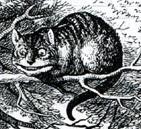Cheshire cat
|
|

The Cheshire Cat is a fictional cat appearing in Lewis Carroll's Alice in Wonderland. It appears and disappears at will, engaging Alice in amusing but sometimes vexing conversation. The cat often points out philosophical points that annoy Alice.
At one point, the cat disappeared gradually until nothing was left but its grin, prompting Alice to remark that she had often seen a cat without a grin but never a grin without a cat. This has become a point of notability for the cat: most people remember it most strongly performing its vanishing act.
Cheshire-Cat-Disney.jpg
There are reports that Carroll found inspiration for the Cheshire Cat in a carving in a church in the village of Croft, Teeside, in the north east of England, where his father had been rector. The cat is named after Carroll's home county, Cheshire.
Brewer's Dictionary of Phrase and Fable says grinning like a Cheshire cat is "an old simile, popularized by Lewis Carrol". Brewer adds, "The phrase has never been satisfactorily accounted for, but it has been said that cheese was formerly sold in Cheshire moulded like a cat that looked as though it was grinning."
Cheshire_Cat_McGee.jpg
The cat also makes appearances in other works based on Alice in Wonderland. For example, American McGee's Alice features a tattooed, emaciated Cheshire cat who is Alice's constant companion and guide. He can also be found in Disney's film version of the books, wearing pink stripes and singing of the Jabberwocky in Sterling Holloway's memorable voice. The cat also appears in Jasper Fforde's novel Lost In A Good Book, in which, in deference to changes in the structure of British local government, it is referred to as the "Unitary Authority of Warrington Cat" (and occasionally as "Cat formerly known as Cheshire").
Quotes
- "Please, would you tell me," said Alice, a little timidly, ... "why your cat grins like that?"
- "It's a Cheshire cat," said the Duchess, "and that's why."
The cat also uses logic to offer non-solutions to Alice's question:
- "But I don't want to go among mad people," Alice remarked.
- "Oh, you can't help that," said the Cat: "we're all mad here. I'm mad. You're mad."
- "How do you know I'm mad?" said Alice.
- "You must be," said the Cat, "or you wouldn't have come here."
Another example of this practice is presented when Alice asks for directions:
- "...thought Alice, and she went on. "Would you tell me, please, which way I ought to go from here?"
- "That depends a good deal on where you want to get to," said the Cat.
- "I don't much care where--" said Alice.
- "Then it doesn't matter which way you go," said the Cat
- "--so long as I get SOMEWHERE," Alice added as an explanation.
- "Oh, you're sure to do that," said the Cat, "if you only walk long enough."
From American McGee's Alice
- "Only a few find the way, some don't recognise it when they do, some don't ever want to."
- "How fine you look when dressed in rage." - A comment to Alice after the player finds a rage box (a power-up) for the first time.
- "When is a croquet mallet like a billy club? I'll tell you: Whenever you want it to be..."
From Terry Pratchett
- "Slowly, the grin disappeared, until nothing was left but the cat. This is nearly as scary as the other way around." (regarding Greebo)
External link
- BBC article about the Croft carving (http://www.bbc.co.uk/tees/features/tees_trail/tees_croft.shtml)de:Cheshire-Katze
